So, we have excursions around the Golden Ring of Russia. For pensioners, this is a welcome adventure; for young people, it is a special subspecies of an extremely boring and meaningless activity. “20 temples in 3 days”, “The most boring guides, pouring out dates”, “Queues in banal places like checking into a hotel” are from the reviews. I think you yourself can imagine all this.
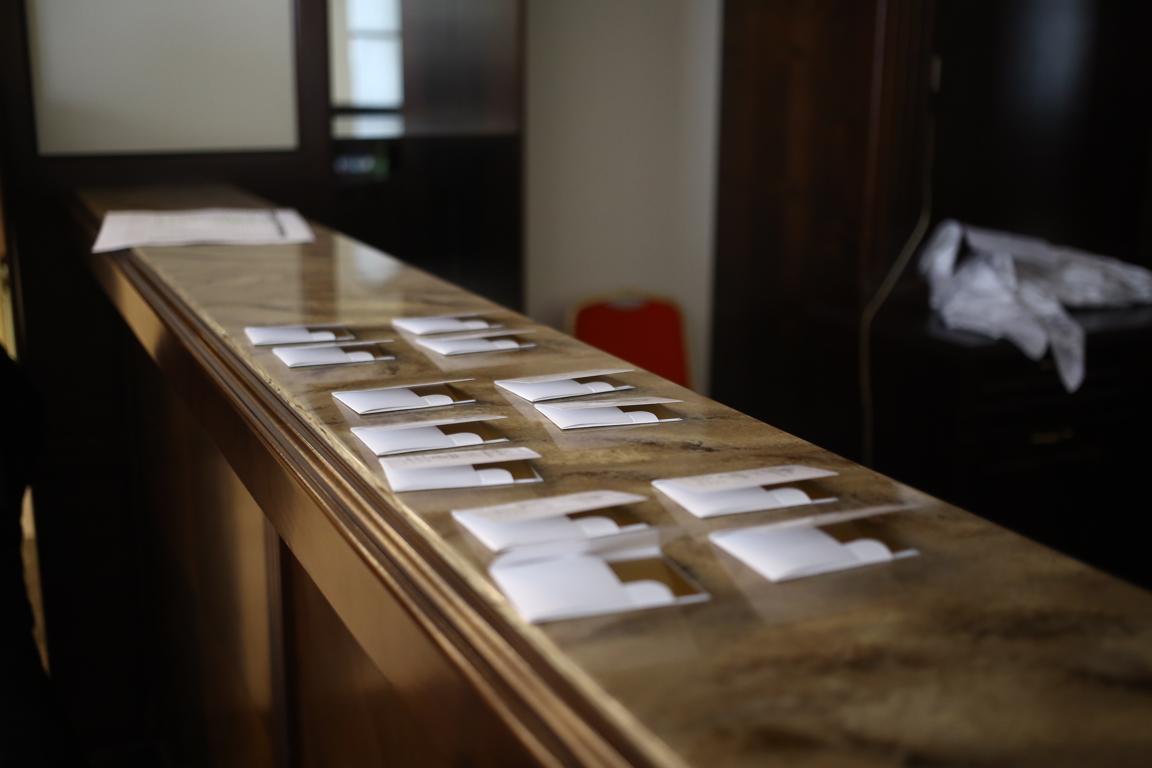
This is how the check-in at the hotel should look like: without people and profiles, damn it!
The first question for any activity is why it is being done. Usually, after competent answers, 20 percent of the projects in the company can be closed, because they are, plus or minus, meaningless. The second question is how to decompose everything and remake each piece in accordance with the purpose.
In the example, they approached a little differently: they rewrote everything that infuriates, and just started thinking how to remove it. An approach that is very familiar to me in retail is a way to dramatically raise the level of service to unprecedented heights. Let's walk through what exactly was done in this example.
Traffic jams at the exit from Moscow
The tour operator "Ankor" has been making tours since 1996. First there was Europe, at some point Russia was added. Our route is the Golden Ring. Target - alpha and beta tests with a panel of experts. The surprises came straight away: we left on Monday morning. Most of the tour groups leave on weekends, just when people go in this direction to the country, and return with those who go to work. This gives approximately 2 hours of losses on the first day.
And only 50 years of tourism is needed to realize that you can start going on Monday.
Why is that? Because most of the ring tours are weekend tours plus a couple of weekdays. But, all of a sudden, tourists can leave without being tied to the weekend. This tour is planned as an entertainment group module so that tourists (including foreign ones) can walk around Moscow on weekends. The program is as follows: we arrived on Friday, walked around the city, examined a fragment of Lenin and an exhibition of the achievements of the Chinese economy, and took the Golden Ring on weekdays. On weekdays, hotels and restaurants are freer, there are no queues at the entrances to the Kremlin and there are no traffic jams. Logistics is becoming more predictable and shorter intervals can be set for “if we get stuck”. This means that there will be fewer boring stories when you arrived earlier and you need to drag out for half an hour.

If you have forgotten the compass and the map at home, you can distinguish the border of the Moscow region by the vending machines
Squeezing the guide
One of the scariest stories is when a guide on the Golden Ring in all seriousness intends to read a two-hour punitive excursion. In our experiment, Ankor asked the guides to read abridged versions of the excursions at each point.
For example, the complex in Suzdal was set aside for 2 hours, but you have to meet an hour. Gold pantry - 15 minutes, show that it is there, let it take a photo, highlight 3 main objects. Bells - to show that they are ringing, and to say how difficult it is, to show the ringer at work. Prison - to show that there were Germans (important for foreign groups) and a couple of cells. Architecture and vegetable garden - another 15 minutes.
The result is strange. Nobody changed the program at all. Some of the guides simply ignored the timings ("Well, somehow, the excursion must be told"), and then got offended that we did not go to some other part of the complex. The other part understood about timings, but did not understand about content, and simply spoke twice as fast. Which is pretty scary, especially when you are bombarded with dates. I was especially struck by the excursion to Yaroslavl, where the guide did not answer a single question to a heap (“this will be further along the tour, do not distract”).

- To tell 18 minutes about one piece of jewelry? Hold my beer!
Another problem is that guides in many cities love money more than the impressions of tourists, and do not allow visitors to conduct excursions to their complexes. That is, you need to bring them tourists, give the guide money on the spot, and he will make an excursion. The scheme "give money to a legal entity and conduct your own excursion" also does not work, only a local guide, only hardcore. They simply do not let outsiders into the territory of the complex, do not allow guided tours, do not certify, and generally interfere organizationally.
As you probably know, this is now being successfully solved by IZI travel and other audio guides, who simply completely throw local guides out of the market. Unfortunately, in the same IZI, during wonderful excursions across Europe and all the outskirts, there is an incredible amount of the same zalepukh with a jumble of dates and names of all the offspring of the king, as in the speech of the official guides. With the intonations of my school literature teacher, who for a long time instilled hatred for the Russian classics in students.
As a result, Ankor decided to switch to mass personalization using a mobile application for the group. But first we need to talk about the fact that the groups are planned to be multilingual.
Multilingual groups
The audio guide is not language specific. An elderly couple of Germans, an American, four Frenchmen and a silent Japanese can go with a team of Russian tourists. This immediately solves a huge number of problems from early booking (critical for Europe - not every operator in our country can provide check-out on the right dates, if you notify us six months in advance) to content. Foreigners want to communicate with real Russian residents, and for them it is very valuable. We know this from the experience of the Transsib, when the greatest happiness is to travel for a day in a reserved seat with men "in pajamas" (in fact, alcoholic T-shirts up to their knees), who do not know the language, but try to be friends. As they can. It ends, of course, disastrously, but everyone likes it.
Ours are also interested in how the Japanese will open the bottle with a Cossack saber (similar to a katana, more precisely, an infantry saber sin-gunto), what the taste of borscht looks like for the French, whether it is possible to drink an American, and what the Germans think about the road from Gavrilov Posad to Ivanovo.
In general, the impressions at every step are simply from interaction with the outside world. "A Russian, a German and a Pole somehow went to the bathhouse ...". The only thing is that foreigners usually want at least one market and more Russian way of life. Everyday life here will be in communication with the other part of the group, and the market will be reduced to something unusual for a fairground - it is still difficult to surprise us with fish and fish.
In the tests, we also communicated with each other on the sly and learned new things. The owner of the bus fleet told how to properly drain gasoline with all sensors. Tour operator - what happened when a bus was hijacked in Italy at night (the group did not notice). Guide - how in Amsterdam they bought group tickets for the metro, and a policeman tried to disperse the tour with the words "demonstrations are prohibited." I know what geologists do when they go to the bushes to pee on the track and the bus leaves. I found out that insurance does not cover getting into a dork in Europe, and I heard how my grandmother handed over a pot of stew in the Louvre to the safe.
But, as you can imagine, you still need something to replace the guide.
Mass personalization
This is a technology when a product is built in such a way that it seems to you a delicate manual assembly, but in fact it is automatically assembled for you. The first swallow was Disneyland back in the analog age.
It is assumed that this will be an application on the terminal on the bus or on the tourist's phone, which can do the following:
- Play audio blocks for a few minutes about what the group is currently seeing.
- Run from the coordinates or from the guide's command (“the guide offers to go to such and such a fragment”).
- Track the guide, bus and toilets on the map and respond to the request for coordinates (“the guide asks to send the geo-position, yes / no”).
- Show various auxiliary things like a map of the Kremlin, a currency calculator, a hotel address, a daily program, and so on.
Interesting, of course, with guide blocks. First, the entire route needs to be decomposed into blocks of 3-5 minutes each. Secondly, each block needs to be not only translated, but also localized. When we talk about kvass, everyone understands everything. But the Japanese will need to explain what this Russian fermented bread juice is. Again, we may be wondering what is the connection between Kiev and Moscow through a historical character, but foreigners do not care - that is, each piece is served in a specific way. It is assumed that the module is divided into a kernel (which needs to be told exactly) and a locale part (usually about 15% additions).
Thematic blocks also vary. The understanding of the region differs for different locales, in each region one of the values or characteristics is highlighted, the culture is explained. That is, by the time of arrival in the city, there is already some background. The most difficult thing in a museum is to make the main and interesting things out of a large volume.
As you understand, such a scheme, brought to mind, as a whole, will allow not only getting rid of boring local guides, but also testing each excursion in terms of interest in each block. And, well, yes, remove the human factor - instead of a guide there will be a robot. And the escort himself will focus on solving the problems of tourists.
In total, this plan will allow you to level the load, and add adventure between foreigners and Russians, and in general it sounds cool. But in dire need of tests. So far, this part is the most difficult for the travel company, because, obviously, they are not developers.
Bus with sockets and long seat spacing
People live with gadgets, and therefore there are USB sockets on every passenger seat of the operator's buses. Since it is planned to make a mobile application with language versions, so the power grid is needed either for terminals or for charging. There is no Wi-Fi, but almost everywhere along the way (with the exception of a couple of places of 20 km between cities) there is good cellular coverage.
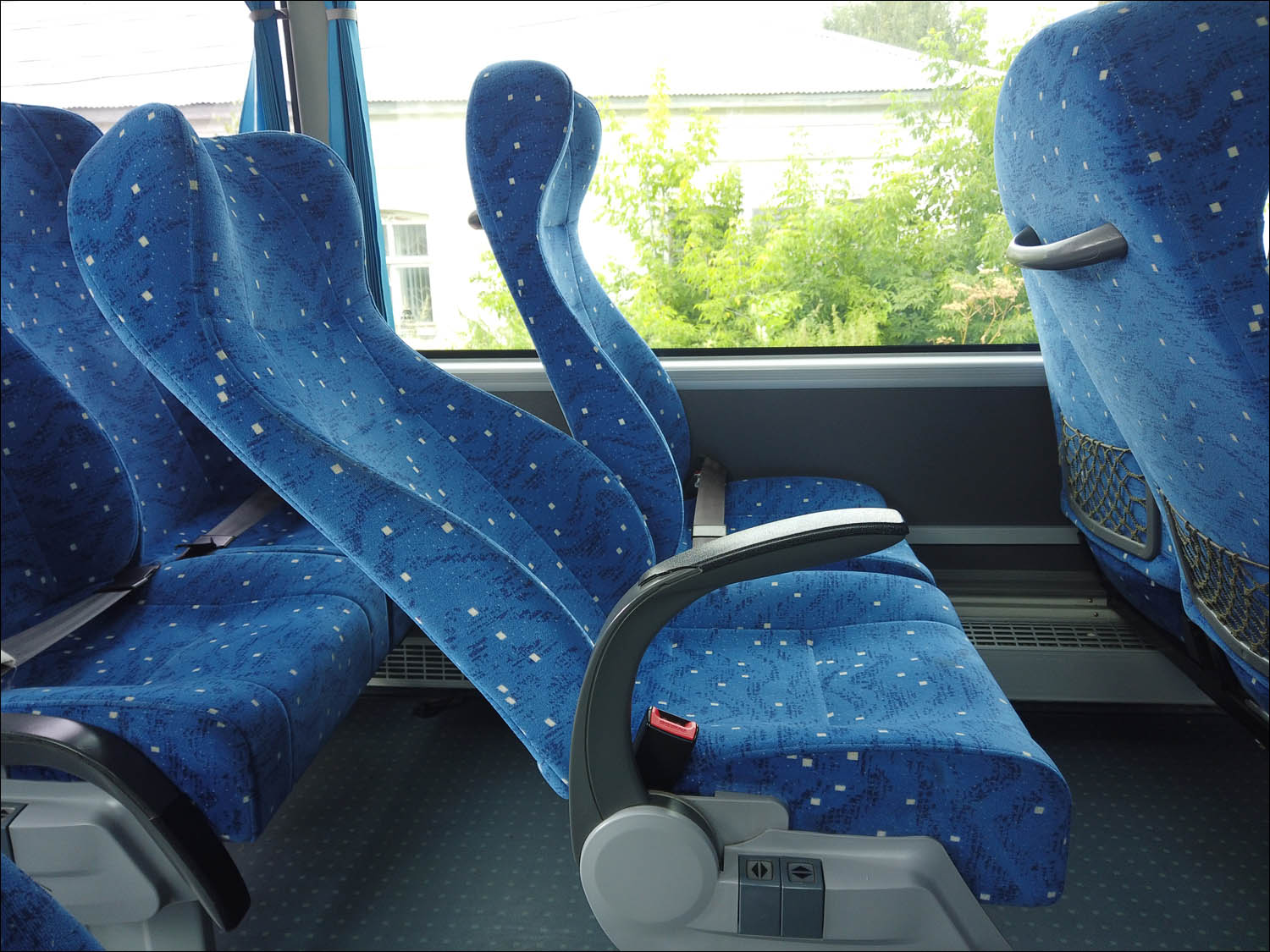
Large seat spacing = backrest reclines normally. The second button on the side is a 6 cm shift towards the aisle.
Check-in before excursions
The canonical way is to take the group to death with five excursions, and then bring it to the hotel and check in in the evening. To sleep smoothly and not stand out in the city. It is almost impossible to lodge during the day: after all, tourists are taken to museums, and museums in the regions close early, usually 17:00, maximum 18:00.
Our protagonists chose a different approach: usually check-in immediately after moving (that is, in the afternoon), and after a sightseeing tour of the next city and dinner at a restaurant. That is, people can leave some of their things, change clothes for the weather in the city, take a shower, put something on exercise, and so on. Usually, the check-in takes about 20-25 minutes before lunch, and this time is enough. In tests, it was clear that people, in general, do not tend to skip meals, so there is no need to wait for anyone on the next excursion.
Classical check-in looks like the height of idiocy - the booking comes with a copy of the passport, and then tourists stand in line at the counter to receive the keys and go through the standard procedures: filling out a questionnaire, a photocopy of the first page of the passport, obtaining a key. Yes, it's one and a half minutes per room, but with a group of 20 people it's already a problem. Tellingly, no one thinks that about half of the actions are meaningless.
Passport scans can be taken from the post office and printed - they are sent when booking. The keys can be laid out on the counter and signed with the names of tourists - let them grab them themselves. The questionnaire can be given either upon check-out, or put in the room and asked to fill it out before check-out.
Ankor instructed the hotels on the way to do just that. For two, even with a detailed explanation of how to improve the process, it came as a shock. And they could not do it right. I'm never surprised, because I see this in almost every country. But still, once it turned out 100% correct.
We should also say about the choice of the hotel. Just as when traveling around the world you will never guess exactly how the tap in the shower works, so in our hotels the very first quest is to find a power outlet. On the Golden Ring, the poking of sockets stands out for its special ingenuity: I saw only one in the refrigerator room, pushed back by a table; and a directly connected underlay for a kettle without an outlet; and the only socket near the entrance to the room, apparently for shoes. Fortunately, at last there were people who choose hotels according to one of the “convenient outlet” weights.
The right food
Do you know what foreigners say in Yaroslavl when they go to dinner? "That red soup again!" Because on the Golden Ring, every restaurant tries to surprise you with traditional Russian cuisine. As a result, we always have borscht for the first, always potatoes with meat in different forms for the second, salad - herring under a fur coat, and dessert - vodka. Three times a day every day in different locations.
I must say that restaurants sensed this from the reviews and began to change the offer. Someone goes into fusion cuisine, someone tries to play with components, and so on. It turns out familiar dishes, cooked in such a way that you want to try them. Well, you know, the difference between the classic barley porridge and this one with chicken hearts, like between "Terminator" and "Terminator 2":
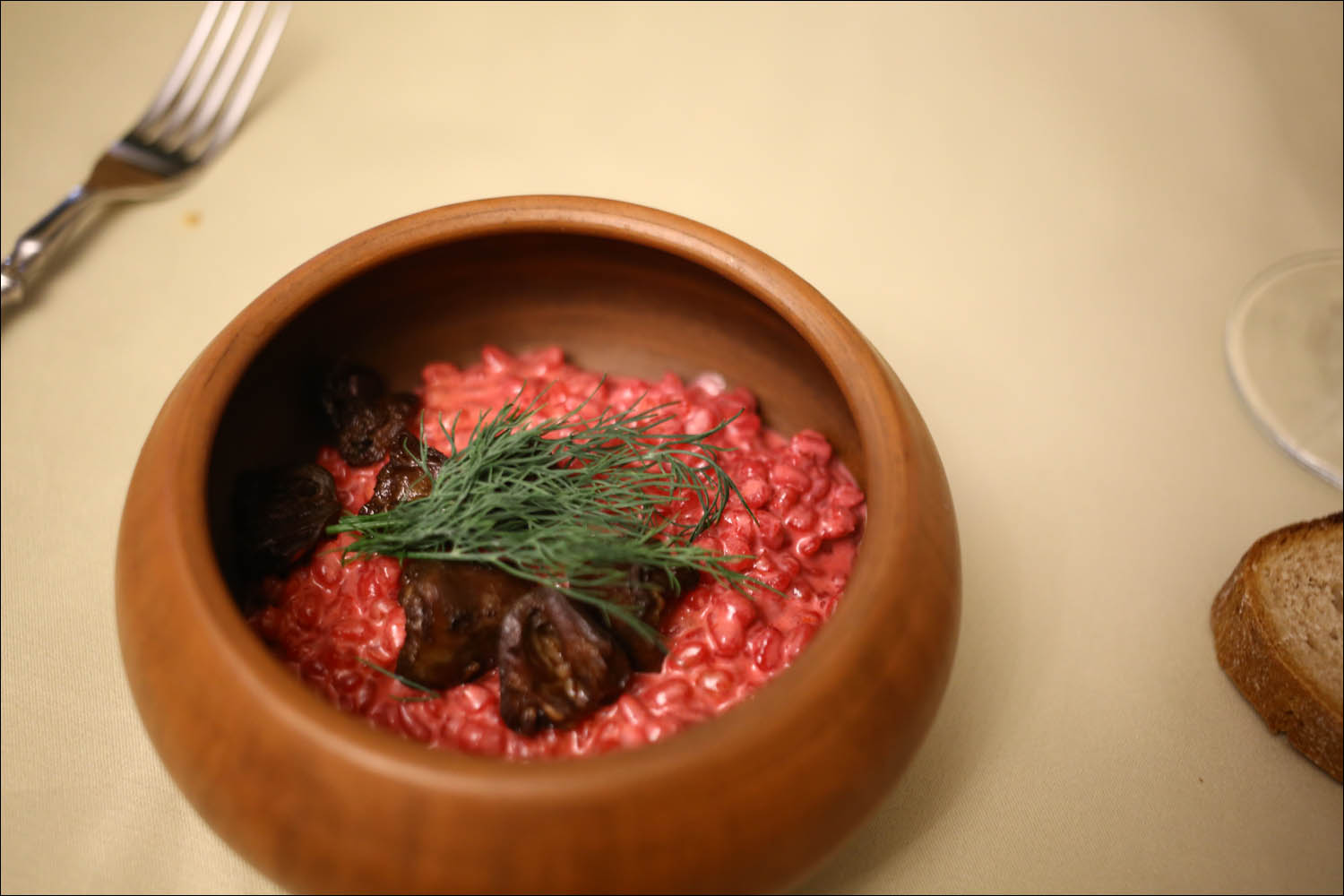
And so - you just need to order different dishes, and not leave the choice at the mercy of the institution with their "set of food for tourist No. 1".
Breakfast: when the hotel has a large flow of tourists, there is usually a buffet, and this suits everyone without exception. I'm not talking about the Finnish buffet right now, which means “you can choose from soup and three types of rusks, but you can refill your plate as much as you like”. Fortunately, we haven't reached this point yet. When the flow is less, or the operator narrows the budget, a set breakfast is served, consisting of real porridge with bread and an imaginary part. So, groups need a continental breakfast if it is portioned - because ours love to eat, and foreigners should feel that the Russians are trying to kill them with food. This is called "hospitality."
Lunch and dinner on the tour program are important not only for food, but also for serving. People go to "switch the picture" and break out of the usual routine, and part of the impression is that everything looks like a holiday. It's not cool to dine in the dining room even on the Golden Ring.
More fixes
The organizer needs to schedule and check the toilets before departure. If there is a problem at the point with a bathroom (it creates a bottleneck, it creates an indelible impression, etc.), then there will be no excursion in this place, or it will be very short, about 15 minutes. Leading foreigners to a hole in the floor is very interesting for immersion in the atmosphere of Ancient Russia, but that is not the goal. It seems to me that inflicting mental suffering is still the principle of providing public services (in almost any country), not commercial ones.
Then the language of the guide: it is supposed to be as simple as possible. Now, participial phrases are considered spam markers, more than three dates per block, and so on. Fragments for the Golden and Manor rings are already being tested in tests. In general, comrades are on the right track.
During the tests, one of the experts noted that 56% of the impressions of the guide are formed by the timbre of the voice. That is, in the reviews it happens "he is caring, kind, but change, the voice with notes of foam squealing on the glass." More precisely, usually it is impossible to formulate it, but people are enraged. You also need to constantly alternate female and male voices in the audio blocks to make it livelier.
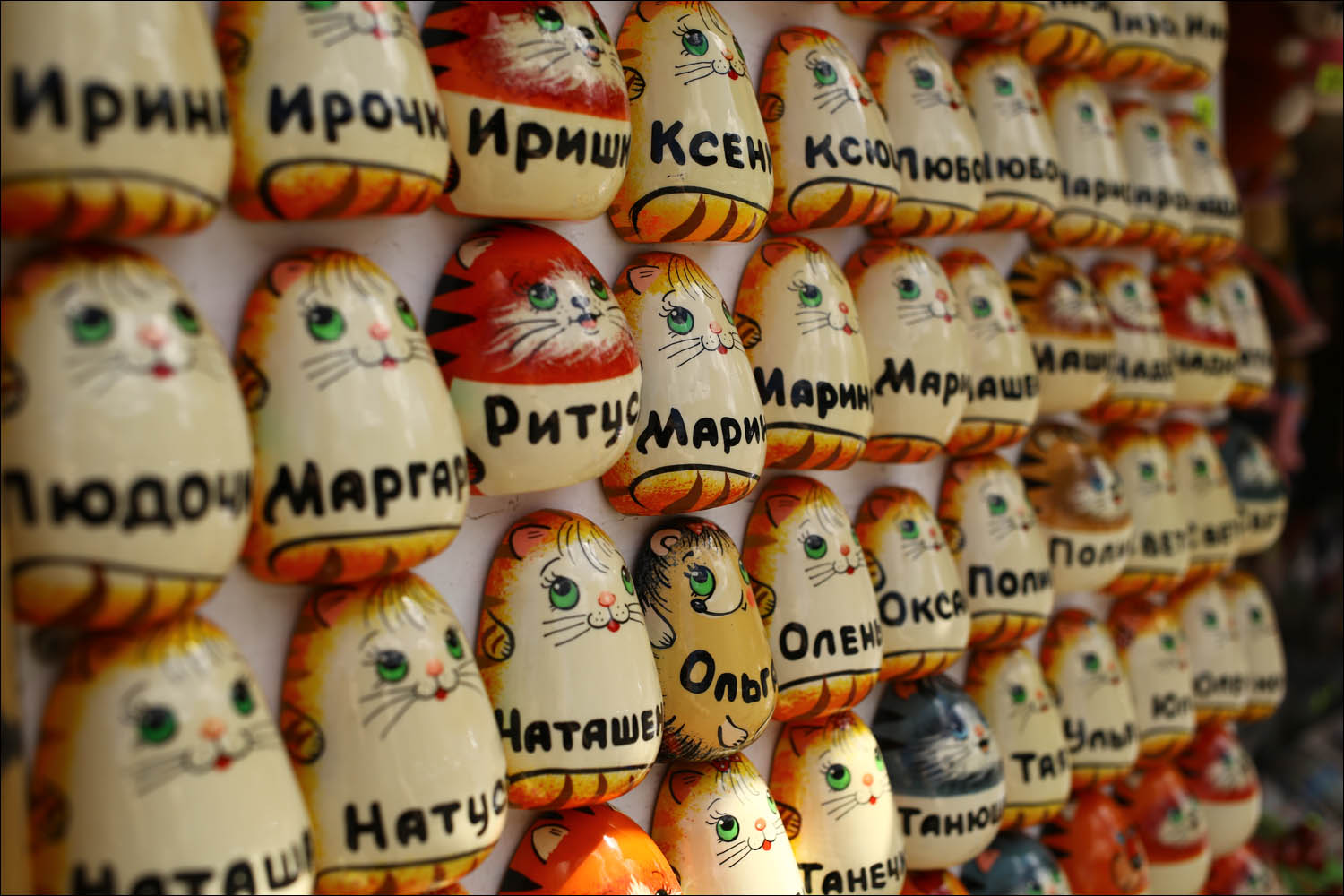
Interestingly, the approach with the application and language blocks also opens the tour product to introverts. Now this audience is very much underestimated due to the fact that a normal introvert simply will not ride the bus with a very high probability. By the way, because you need to follow the guide and catch his words, which is very annoying on excursions. As part of the test, we went with radio guides (there were no recorded blocks, but the guide gave the same material to the channel), which turned out to be very cool. The feeling is almost like an independent trip - even if two blocks from the group you look at an excellent mutolva in a pattern on the wall, you can hear that the Mongols are not at all in business during the burning of the Suzdal Kremlin. By the way, our guide said that the buses have a standard switch for the radio microphone, but very few people use it.Somehow thanks to this, her tour was broadcast to 17 buses in the square.
In general, it turns out quite interesting for a niche audience. The product is slightly more expensive than the usual one, but paying 5-7% on top for not remembering a childhood trauma from a Soviet guide - there are such people. Actually, I know very well from my research that about 18% of people consider any travel in Russia to be dull. Here I must say that Ankor has actually already proved that it can open a niche to the whole market. In 1996, they took them to Paris and Rome, then the request was for "5 countries in a week by bus." Then an unexpected request for comfort appeared: they began to dock a plane to Europe and a bus on the spot, and for foreigners - so that in Russia there was a night on the train. For the Germans, for example, this is wildly cool, because the train simply cannot travel long enough to sleep there. Then the request of our tourists evolved into thematic excursions,and "Ankor" began to carry their own guides (it turned out cheaper than hiring on the spot). Already around 2005, it became important to switch to high-quality content within the tour: so that relaxation, delights, and thematicity. The level of the guides changed: they needed not only an expert, but also a psychologist who understood what the tactical situation was on the bus. In addition to choosing a topic, it is also important to do so that at least 15-20% of the information supplied to a person is familiar and understandable, otherwise there will be rejection. On the Golden Ring, by the way, this information should be up to 25-30%, otherwise people will think that they do not know their country at all, and this spoils the mood and generates a small inferiority complex. A person should feel comfortable consuming information. This is also an important trend.Already around 2005, it became important to switch to high-quality content within the tour: so that relaxation, sophistication, and thematicity. The level of the guides changed: they needed not only an expert, but also a psychologist who understood what the tactical situation was on the bus. In addition to choosing a topic, it is also important to do so that at least 15-20% of the information supplied to a person is familiar and understandable, otherwise there will be rejection. On the Golden Ring, by the way, this information should be up to 25-30%, otherwise people will think that they do not know their country at all, and this spoils the mood and generates a small inferiority complex. A person should feel comfortable consuming information. This is also an important trend.Already around 2005, it became important to switch to high-quality content within the tour: so that relaxation, delights, and thematicity. The level of the guides changed: they needed not only an expert, but also a psychologist who understood the tactical situation on the bus. In addition to choosing a topic, it is also important to do so that at least 15-20% of the information provided to a person is familiar and understandable, otherwise there will be rejection. On the Golden Ring, by the way, this information should be up to 25-30%, otherwise people will think that they do not know their country at all, and this spoils the mood and generates a small inferiority complex. A person should feel comfortable consuming information. This is also an important trend.what a tactical situation on the bus. In addition to choosing a topic, it is also important to do so that at least 15-20% of the information supplied to a person is familiar and understandable, otherwise there will be rejection. On the Golden Ring, by the way, there should be up to 25-30% of such information, otherwise people will think that they do not know their country at all, and this spoils the mood and generates a small inferiority complex. A person should feel comfortable consuming information. This is also an important trend.what a tactical situation on the bus. In addition to choosing a topic, it is also important to do so that at least 15-20% of the information supplied to a person is familiar and understandable, otherwise there will be rejection. On the Golden Ring, by the way, this information should be up to 25-30%, otherwise people will think that they do not know their country at all, and this spoils the mood and generates a small inferiority complex. A person should feel comfortable consuming information. This is also an important trend.consuming information. This is also an important trend.consuming information. This is also an important trend.
The first technologies for the ring were worked out with the Germans, who had taken their tourists around Europe for a long time. From here came the booking of a seat on the bus when buying a tour (for some, this is very important). The Germans went through the same problems decades ago that we have now: there are few good guides, no one wants to take headphones (“Well, I’ll tell you so!” - in our tests, 4 guides simply refused to work with equipment). There is no basic understanding of human physiology (or respect for the group). Regional guides often have a tendency to make people suffer at the monument as they tell the story of how many meters and how many bricks were spent. Yes, rain, yes, hail, yes, the wind blows, but the tourists paid! Obtaining information is work, so let them work! The same can be said on the bus in advance. And if the guide is smart, then you can't tellbut to do it interactively, offer to estimate the height in advance, guess how much it weighs. A lot of what is said about guides struggles with how you generally need to present pop-science information. This is incredibly interesting, and I will also tell about this a little later, when I systematize the experience of a couple more people.
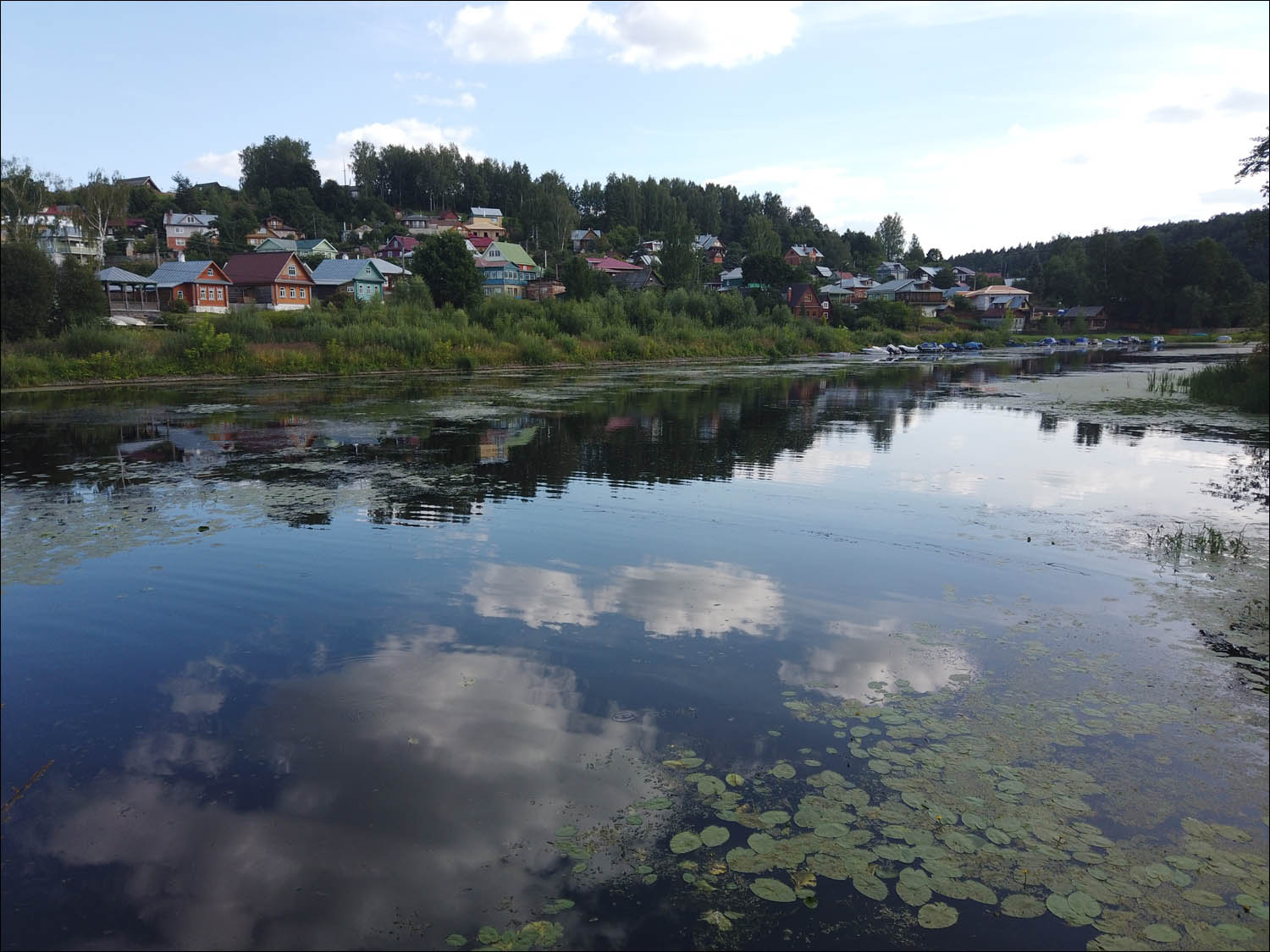
?
I liked the approach. Ira (the project manager) is not understood by many in tourism, but in the regions it is generally the same when trying to reformulate from “here you can touch the unique atmosphere of Ancient Russia and feel the spirit of the times” to “Look, what a cool temple, here a lion was painted on the wall according to verbal description, here it is "almost lifted on a pitchfork with the words:" How dare you, you do not understand anything about tourism! " That's right, because some people studied for 5 years, and then trained for 10 years in order to fly out of the market now. Another superstitious horror is caused by such passages as passing through the city with a stop at one museum (hello, Ivanovo, while Ivanovo!), The exclusion of any significant places such as 10 more churches in the program, and so on.

This is illegal, or rather, this announcement concerns only the personnel of the facility.
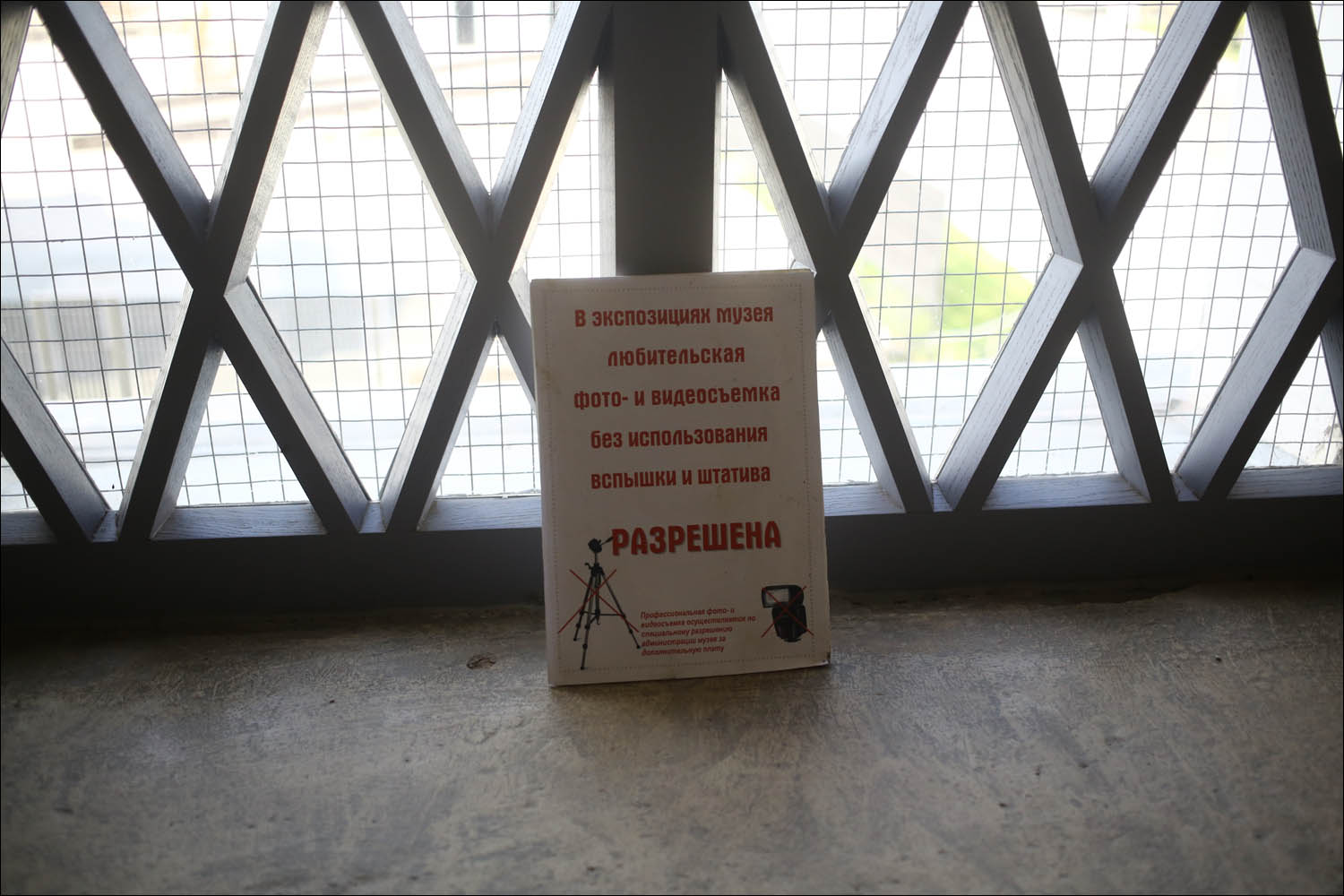
But this is unexpected
But somewhere they perceive it normally and even well. Because they understand that now the market needs something else. Perhaps because they saw the results of our research that only 3% of Europeans are ready to go to Russia. Because the invisible hand of the market shows those who don't change an invisible fig. In this regard, I especially like the story of the local history museum in Ivanovo. There was an old story about a ghost living in the museum. Now the cats reacted to him, then someone saw him. In general, the issue was closed by installing motion sensors and cameras. The ghost stopped showing up. The museum was not taken aback and made regular night excursions - around the dark museum with flashlights to the stories about the unfortunate spirit. And behind the group, at the edge of the world, a junior researcher in a suit sneaks up.
On the other hand, in every city there is still a movie, stories about which you get sick. When visiting some temples, the group is still obliged to go to the church shop for 10 minutes at the end, otherwise they will not be allowed into the territory. Even paid food for ducks may end up at the other end of the Kremlin long after the ducks themselves. The level of service almost everywhere is simply shocking in its horror (and I know what I am talking about, after 10 years of retail), and it will be difficult to fix it, and then it will be snot. In general, if not for the closure of the international line, then many experts in life would not have traveled along the Golden Ring. And so it happened not only to show the first changes, but also to highlight many cities. I want to go back to Kostroma for a moose farm, in Gavrilov Posad for a museum of Russian drinks and a stud farm, in Ivanovo for the sake of constructivism, and just for a walk in Suzdal.
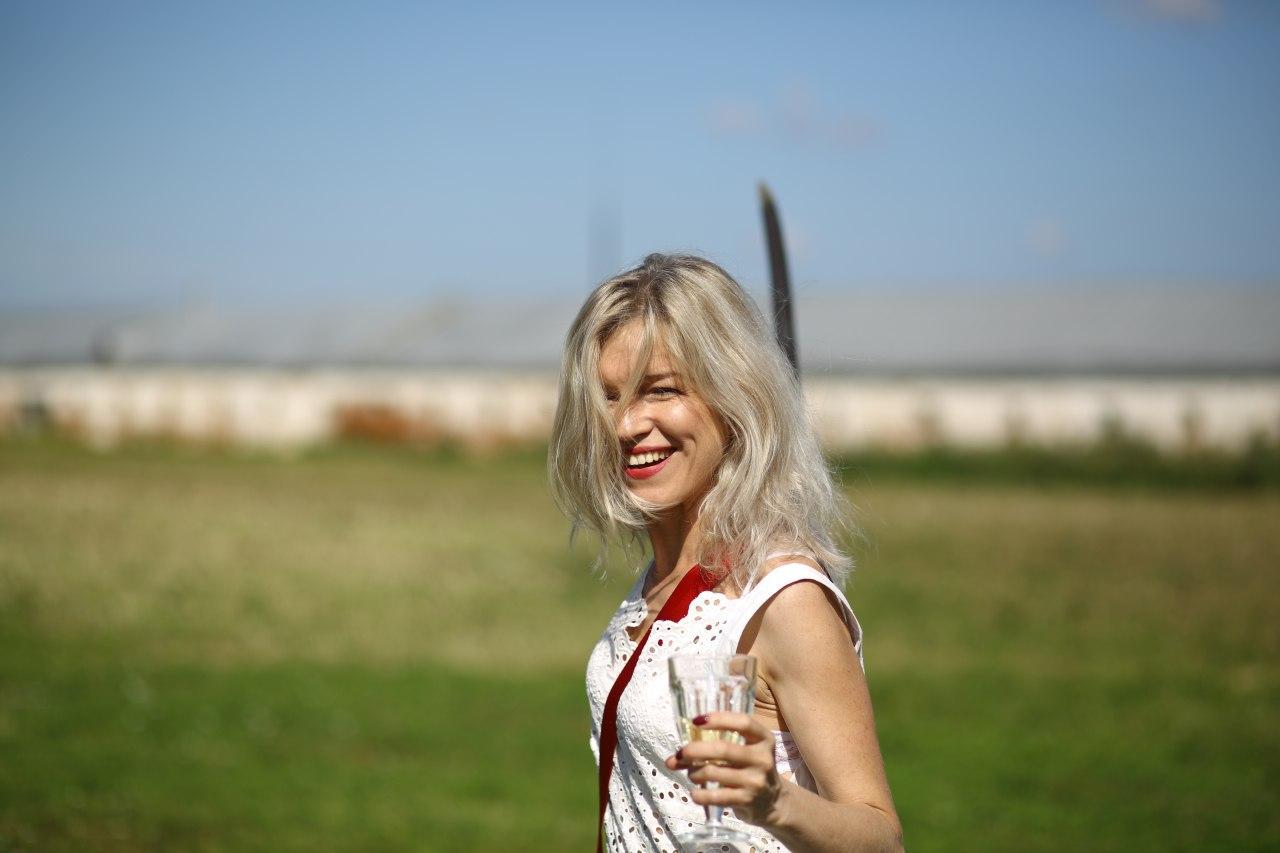
Common sense was with us and Ira Mashtakova, director of the Ankor tour operator. I hope the product will work out in the end.